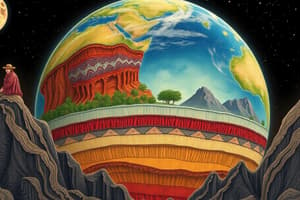Podcast
Questions and Answers
What is the composition of the Earth's core?
What is the composition of the Earth's core?
- Highly viscous materials
- mostly silicates
- Fe and Ni (correct)
- Rocks and minerals
What is the lithosphere?
What is the lithosphere?
- A layer of liquid magma
- A layer of hot, viscous material
- A solid, rigid, and elastic layer (correct)
- A layer of high pressure and temperature
What is the main evidence for the Continental Drift Theory?
What is the main evidence for the Continental Drift Theory?
- Mountain Ranges
- Continental Jigsaw Puzzle (correct)
- Seafloor Spreading
- Convection Currents
What is the process by which new seafloor is created?
What is the process by which new seafloor is created?
What is the rate of plate movement?
What is the rate of plate movement?
What is the mechanism driving plate movement?
What is the mechanism driving plate movement?
What is the process by which one plate is forced beneath another?
What is the process by which one plate is forced beneath another?
What is the evidence for the fit of continents?
What is the evidence for the fit of continents?
What is the significance of the scars and scratches found on rocks in different countries?
What is the significance of the scars and scratches found on rocks in different countries?
What pattern is observed in the distribution of volcanoes, earthquake epicenters, and mountain ranges?
What pattern is observed in the distribution of volcanoes, earthquake epicenters, and mountain ranges?
What type of plate boundaries are characterized by the Pacific Ring of Fire?
What type of plate boundaries are characterized by the Pacific Ring of Fire?
What is a characteristic of the Mid-Atlantic Ridge?
What is a characteristic of the Mid-Atlantic Ridge?
What can be inferred from the presence of fossils of extinct plants and animals on different continents?
What can be inferred from the presence of fossils of extinct plants and animals on different continents?
What is the significance of the stripes found on rocks?
What is the significance of the stripes found on rocks?
What is a characteristic of mountain ranges?
What is a characteristic of mountain ranges?
Flashcards are hidden until you start studying
Study Notes
Earth's Composition and Structure
- The Earth has a liquid outer core and a solid inner core composed of iron (Fe) and nickel (Ni)
- The mantle is composed mostly of silicates (Si and O)
- The crust is composed of rocks and minerals, with continental crust being low density and oceanic crust being high density
Lithosphere and Asthenosphere
- The lithosphere is the solid, rigid, and elastic layer comprising the upper mantle and crust
- There are 7 major plates: African, Antarctica, Eurasian, Indo-Australian, North-American, Pacific, and South American plates
- Minor plates include the Caribbean, Scotia, Arabian, Indian, Philippine, Juan de Fuca, Cocos, and Nazca plates
- The lithosphere floats on the asthenosphere and slides horizontally over it
- The asthenosphere is highly viscous, with high pressure and temperature
Continental Drift Theory
- Alfred Wegener proposed that continents were once a single large landmass (Pangea)
- Pangea broke into two smaller supercontinents, which eventually broke into continents
- Evidence includes the continental jigsaw puzzle, seafloor spreading, and fossil distribution
Seafloor Spreading Theory
- Harry Hess proposed that hot, less dense material rises from below the Earth's crust, creating a crack and magma flows out, cools down, and becomes new seafloor
Plate Tectonics Theory
- There are 7 major plates that move smoothly at a rate of 1-16 cm/yr
- Movement types: convergent, divergent, and transform
- Mechanism: convection current
- Evidence includes continental fit, similarities between rock layers, mountain ranges, fossils, glacial evidence, coral reefs, and seafloor magnetic stripes
Plate Boundaries
- Distribution of volcanoes, earthquakes, epicenters, and mountain ranges are concentrated in specific areas (Circum-Pacific Belt, Mid-Atlantic Belt, and Mid-Continental Belt)
Volcanic Belts and Mountain Ranges
- Volcanic belts: regions with high levels of volcanic activity
- Mid-Atlantic Ridge: part of the Mid-Atlantic Belt, along divergent plate boundaries, with youngest crust
- Pacific Ring of Fire: part of the Circum-Pacific Belt, with 75% of the world's active volcanoes, along transform and convergent plate boundaries
- Mediterranean Sea: part of the Mid-Continental Belt, along convergent plate boundaries
- Mountain belts: regions with mountain ranges, located along plate boundaries where collision of plates occurs
Studying That Suits You
Use AI to generate personalized quizzes and flashcards to suit your learning preferences.




